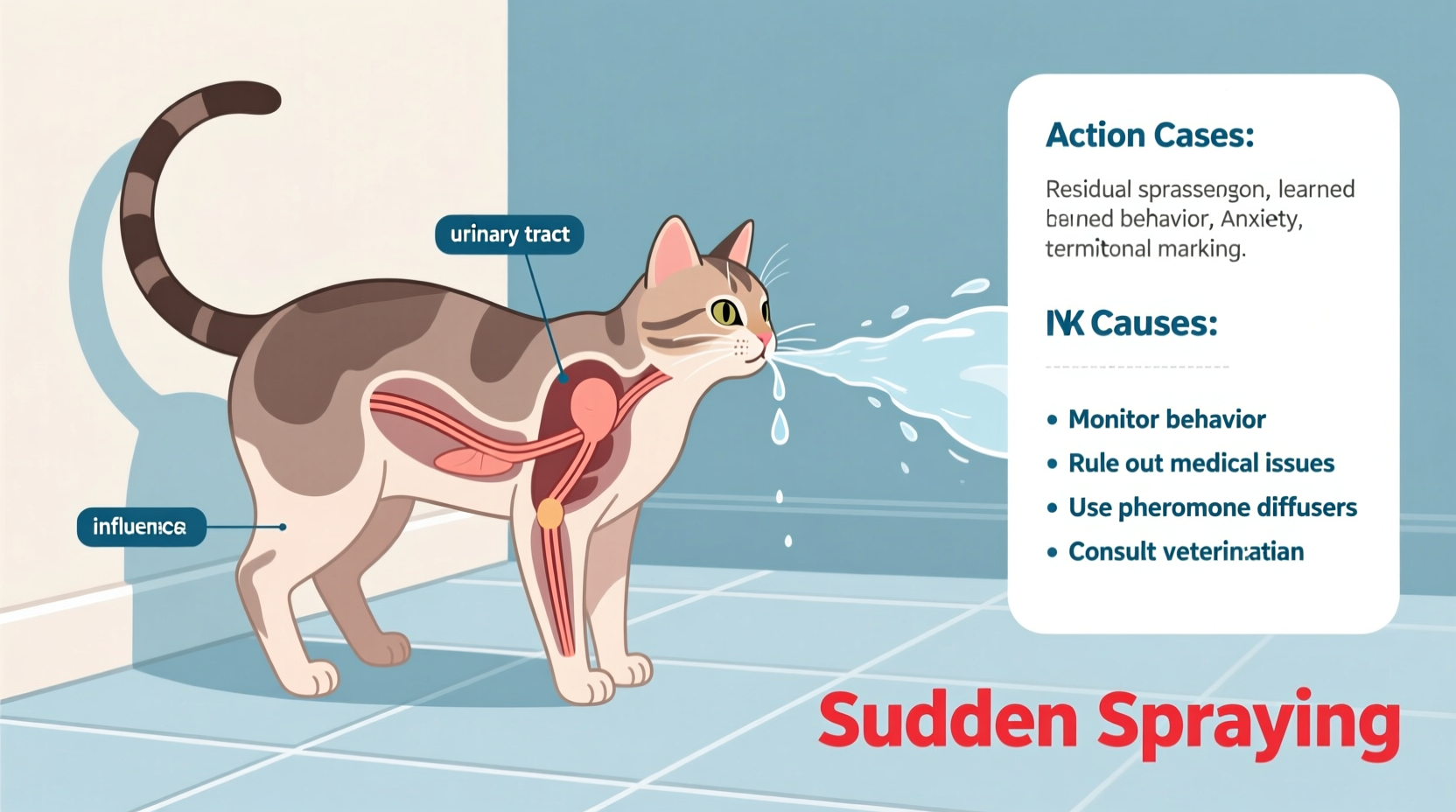Neutering is a common procedure recommended for male cats to reduce unwanted behaviors like roaming, aggression, and urine marking. While most cats show improvement in these behaviors post-surgery, some owners are surprised when their cat begins or continues spraying *after* being neutered. This unexpected development can be confusing and frustrating. Understanding the underlying causes—medical, behavioral, or environmental—is essential to addressing the issue effectively.
Spraying is not the same as regular urination. It involves a cat backing up to a vertical surface, lifting its tail, and releasing a small amount of urine, often with a strong odor. The behavior is typically territorial or stress-related. While neutering reduces testosterone-driven marking in about 85–90% of cases, it doesn’t eliminate the possibility entirely. In some instances, spraying may persist—or even start—for reasons unrelated to sexual hormones.
Why Spraying May Occur After Neutering

The assumption that neutering will immediately stop all marking behaviors is understandable but not always accurate. Several factors can contribute to sudden spraying after the procedure:
- Hormonal lag: Testosterone levels don’t drop instantly after surgery. It can take several weeks for residual hormones to clear from the system, during which time marking behavior may continue.
- Learned behavior: If a cat was already accustomed to spraying before neutering, the habit may persist even after hormone levels decrease.
- Stress or environmental changes: New pets, moving homes, renovations, or even changes in routine can trigger anxiety-induced spraying.
- Medical issues: Urinary tract infections, bladder stones, or other health problems can cause discomfort, leading a cat to associate pain with the litter box and resort to spraying elsewhere.
- Perceived threats: Outdoor cats visible through windows, unfamiliar scents on clothing, or new household members (including babies or partners) can make a cat feel insecure.
“Even after neutering, cats may spray if they feel their territory is under threat. It’s less about mating and more about control and security.” — Dr. Lena Patel, Feline Behavior Specialist
Step-by-Step Guide to Address Post-Neuter Spraying
Addressing spraying requires a systematic approach. Jumping to conclusions or punishing the cat will only increase stress and worsen the problem. Follow this timeline to identify and resolve the root cause:
- Wait 4–6 weeks post-surgery: Hormone levels need time to stabilize. Marking during this window may resolve on its own.
- Rule out medical issues: Schedule a vet visit. Request a urinalysis to check for infections, crystals, or inflammation.
- Assess environmental stressors: Consider recent changes at home. Has there been a new pet, visitor, or rearrangement of furniture?
- Clean sprayed areas thoroughly: Use enzymatic cleaners to break down odor molecules. Avoid ammonia-based products, which mimic urine scent.
- Reduce triggers: Block visual access to outdoor cats with window films. Use pheromone diffusers (like Feliway) to promote calmness.
- Reinforce positive litter habits: Ensure clean, accessible litter boxes (one per cat plus one extra). Try different litters if aversion is suspected.
- Consult a behaviorist: If spraying persists beyond two months post-neuter, professional guidance may be necessary.
Do’s and Don’ts: Managing Spraying Behavior
| Do’s | Don’ts |
|---|---|
| Use enzymatic cleaners on soiled areas | Scrub with bleach or ammonia-based cleaners |
| Provide multiple litter boxes in quiet locations | Place litter boxes near noisy appliances or high-traffic zones |
| Use synthetic feline facial pheromones (Feliway) | Punish or yell at the cat after spraying |
| Keep windows covered to block stray cat sightings | Allow outdoor cats to roam near your property unchecked |
| Monitor diet and hydration to support urinary health | Ignore signs of frequent urination or straining |
Real Example: Max’s Post-Neuter Spraying Journey
Max, a 1-year-old tabby, was neutered to curb his tendency to mark near the front door. His owner, Sarah, expected immediate results. Instead, three weeks after surgery, Max began spraying on the living room curtains—something he’d never done before.
Concerned, Sarah took Max to the vet. Tests revealed no infection, but the vet noted that a new construction project next door had started around the same time. The noise and presence of workers triggered anxiety in Max, who associated the disturbance with a threat to his territory.
Sarah installed privacy film on her windows, placed a Feliway diffuser in the living room, and created a quiet retreat space for Max upstairs. She also deep-cleaned the sprayed areas with an enzymatic solution. Within two weeks, the spraying stopped completely. By addressing the environmental stressor rather than assuming hormonal causes, Sarah resolved the issue without medication or long-term behavioral interventions.
Checklist: What to Do If Your Cat Starts Spraying After Neutering
- ✅ Wait at least 4–6 weeks before concluding the behavior is persistent
- ✅ Schedule a veterinary exam to rule out UTIs or bladder issues
- ✅ Identify recent changes in the household or environment
- ✅ Clean all sprayed surfaces with enzymatic cleaner
- ✅ Install Feliway diffusers in key areas (e.g., near entry points or where spraying occurs)
- ✅ Ensure adequate litter box access and cleanliness
- ✅ Limit visual exposure to outdoor cats or unfamiliar animals
- ✅ Consider a consultation with a certified feline behaviorist if unresolved
Frequently Asked Questions
Can neutering cause sudden spraying in cats?
No, neutering itself does not cause spraying. However, if a cat was already prone to marking, the behavior may continue temporarily due to lingering hormones. In rare cases, stress from the surgery or recovery process may trigger anxiety-related spraying.
How long after neutering should spraying stop?
In most cases, if spraying is hormone-driven, it should diminish within 4 to 6 weeks post-surgery. If it persists beyond two months, investigate medical, environmental, or behavioral causes.
Is it normal for a neutered cat to spray years later?
While less common, yes. Older neutered cats may resume spraying due to new stressors, cognitive decline, or medical conditions such as kidney disease or hyperthyroidism. Any sudden change in behavior warrants a vet visit.
Taking Action: A Calm, Consistent Approach Wins
Spraying after neutering is unsettling, but it’s rarely a sign of defiance or poor training. Cats communicate through scent, and spraying is often a cry for security in an uncertain world. Reacting with anger or punishment only deepens their anxiety. Instead, focus on understanding the message behind the behavior.
Start with patience. Allow time for hormonal balance. Then methodically eliminate medical causes and environmental stressors. Small adjustments—like blocking a window or adding a litter box—can yield dramatic improvements. Most importantly, remember that your cat isn’t trying to upset you; it’s trying to cope.









 浙公网安备
33010002000092号
浙公网安备
33010002000092号 浙B2-20120091-4
浙B2-20120091-4
Comments
No comments yet. Why don't you start the discussion?